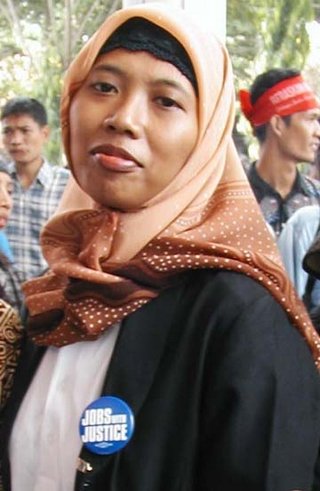Elena Williams
Ngadinah, union leader and worker activist |
Indonesian trade unions are often considered to be male arenas. In the official union of the Suharto years, women took administrative roles or didn’t become involved at all. But the face of the union movement has changed since Suharto’s fall in 1998. As unions have multiplied at the local, regional and national levels, women have begun to take on a much more active role, making their voices heard, accepting positions of leadership and recruiting new members. They are taking action on the factory floor and beyond, attending national union conferences and engaging in collective bargaining and strikes.
In the factory and beyond
One union actively seeking change is a small, all-female factory-level union in West Java. Around the time of reformasi, 77 members of the majority union in this export-oriented garment factory broke away to form a smaller, independent union. Unlike women-only unions in Korea and Japan, this union doesn’t exclude men intentionally. As union president Ibu Dewi says, her union’s all-female membership reflects the predominantly female workforce in the textile, garment and footwear sector across Indonesia rather than any attempt to promote a specifically ‘female’ agenda.
Since its formation in 1998, the union has concentrated on localised, grassroots campaigns, funded by members’ dues and financial support from a local legal aid organisation. Despite this outside support, it’s not easy for women to be active in the union. Many members support husbands who have lost their jobs at nearby factories, as well as their small children or other family members. Wages barely cover members’ personal needs each month, so women do overtime in addition to their regular eight hour shifts. For some, this may be as little as an extra two hours per week, but for others it can be as much as 25 hours every week. This makes it hard to find time to dedicate to union activities. As one member commented, ‘Most days we all finish at different times so it’s quite hard to organise our meetings. We only really have the opportunity to meet two or three times a month.’
But despite these challenges, union members have successfully campaigned for pay increases and the right to menstruation and maternity leave. Workers now receive Rp7000 (approx. A$1) for every hour of overtime worked, when previously the first two hours of overtime were never paid. In another successful case, the union succeeded in abolishing the requirement for women to ‘prove’ that they were menstruating by submitting to a physical examination before they could claim menstruation leave.
The union’s members have also been active outside the workplace, recruiting new members and educating other local factory workers about their rights at work and what unions can do for them. Many of them see this as an integral part of union organising. As one member puts it, ‘It’s important to organise after work as well, to talk to our neighbours, to the other women living nearby, because that way we can share our experiences and learn from each other.’
Inspiring change
This union has focused on local issues, but members know they are part of something bigger. They are inspired by strong women locally and nationally, who have shown just what women can do. Many members identified Ibu Dewi, their leader, as their inspiration because she challenges the stereotypes of women unionists. ‘She has done incredible things at the factory and she continues to keep everyone motivated,’ says one 22-year-old member. ‘She’s so strong – I don’t think there’s anything she can’t do.’
Local women like Ibu Dewi join inspirational figures at the national level, such as Marsinah, Dita Sari and Ngadinah. The memory of Marsinah, the worker-martyr killed in East Java in 1993, still lingers on as a source of inspiration for both male and female union members, and each year memorials are held in her honour. Dita Sari, a long-time unionist and labour rights activist, stood firm in refusing to accept the Reebok Human Rights Award on the grounds that it was ‘hypocritical’ when conditions in Reebok factories were still below average in Jakarta and Tangerang. In Jakarta, the well-documented case of union leader and worker, Ngadinah, jailed following her participation in a workplace strike, has encouraged many young women unionists to voice their opinions and participate in their unions.
Strong unions need strong women, particularly in the feminised textile, clothing and footwear industries. As the grassroots experiences of Ibu Dewi and her colleagues show, when women act together to prioritise the demands of women workers they not only effect change in their own workplaces, but encourage women workers all over the country to do the same. ii
Elena Williams (elewilliams@gmail.com) is an Honours student at the University of Sydney.
